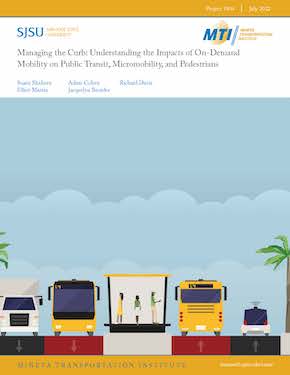- 408-924-7560
- mineta-institute@sjsu.edu
- Donate
Managing the Curb: Understanding the Impacts of On-Demand Mobility on Public Transit, Micromobility, and Pedestrians
In recent years, innovative mobility and shifts in travel and consumption behavior are changing how people access and use the curb. Shared mobility—the shared use of a vehicle, bicycle, scooter, or other mode—coupled with outdoor dining, curbside pick-up, and robotic delivery are creating new needs related to the planning, management, and enforcement of curb access. This study examines curb planning and management from several angles, such as safety, social equity, and multimodal connections. This research employs a multi-method approach to identify the changing needs for curb space management and how to meet these needs through new planning and implementation policies and strategies. As part of this study, the authors conducted 23 interviews. Respondents were chosen to represent public, private, and non-profit sector perspectives. Additionally, the authors employed a survey of 1,033 curb users and 241 taxi, transportation network company (TNC), and public transportation drivers. The study finds that changes in mode choice and curbside use can result in a variety of impacts on access, social equity, congestion, device management, pick-up and drop-off, and goods delivery, to name a few. The curb also has the potential to be disrupted by emerging modes, such as robotic delivery vehicles (also known as personal delivery devices) and automated vehicles. As these emerging developments continue to impact the curb, it is becoming increasingly important for policymakers to have an appropriate framework for planning and managing curb space in urban areas.
SUSAN SHAHEEN
Susan Shaheen was among the first to observe, research, and write about the changing dynamics in shared mobility and the likely scenarios through which automated vehicles will gain prominence. She is a Professor in Civil and Environmental Engineering at the University of California, Berkeley. She also co-directs the Transportation Sustainability Research Center (TSRC) of the Institute of Transportation Studies (ITS) Berkeley. She has authored 84 journal articles, over 160 reports and proceedings articles, 34 book chapters, and co-edited three books. She has advised over 30 Master’s and PhD students and mentored 150 undergraduate students. She has received international and national awards, including the 2017 Roy W. Crum award from the Transportation Research Board (TRB) for her distinguished achievements in transportation research. From January 2021 to January 2022, she served as Chair of TRB’s Executive Committee and Vice Chair from 2020 to 2021. Professor Shaheen was the chair of the Emerging and Innovative Public Transport and Technologies Committee of TRB, and she was the founding chair of subcommittee for Shared-Use Vehicle Public Transport Systems of TRB. At present, she is and an Associate Editor for Transportation Research, Part A; Travel Behaviour and Society; and the Transportation Research Record. She is a member of the World Conference on Transportation Research Society (WCTRS) Steering Committee and Mobile Source Technical Review Subcommittee to the U.S. Environmental Protection Agency’s Clean Air Act Advisory Committee. She also served two terms on the ITS Program Advisory Committee to the U.S. Department of Transportation and a Desk Editor for Transport Policy from 2016 to 2021.
ELLIOT MARTIN
Elliot Martin conducts research in shared-use mobility, public and freight transportation, transportation energy, and life-cycle assessment. He has conducted advanced research that measures the impact of shared mobility systems on greenhouse gas emissions, modal shift, and household vehicle holdings. He has led a major research-deployment project on truck parking availability within California, analyzed data from urban parking systems, and supported research in advanced- and alternative-fuel vehicles. He specializes in research instrument design and applies statistical approaches to the analysis of freight movement, sensor performance, vehicle activity data, and travel behavior surveys. Elliot earned a PhD in transportation engineering following a dual Masters in transportation and city planning, all at UC Berkeley. He completed his undergraduate degree at Johns Hopkins University. He previously was an assistant economist at the Federal Reserve Bank of Richmond.
ADAM COHEN
Adam Cohen has over 17 years of experience as a researcher with the Transportation Sustainability Research Center at the University of California, Berkeley, and 13 years of experience as a researcher with the Mineta Transportation Institute of San Jose State University. Adam co-chairs TRB’s standing subcommittee on the Equity of Innovative Mobility Services and Technologies AP020(3). He currently serves as Vice Chairman of SAE International’s Shared and Digital Mobility Committee and is the co-sponsor of SAE JA3163 which establishes standard terms and definitions for shared and on-demand mobility. Previously, Adam worked for the Department of Homeland Security (DHS) and the Information Technology and Telecommunications Laboratory (ITTL) at the Georgia Tech Research Institute (GTRI).
JACQUELYN BROADER
Jacquelyn Broader is a researcher with the University of California, Berkeley’s Transportation Sustainability Research Center. Her research focuses on various topics including integrating emerging on-demand modes into communities, evaluating different state and federally funded projects for accessibility and equity opportunities and challenges, understanding the potential role of the sharing economy in evacuations, and doing feasibility studies of innovative transportation strategies (e.g., mileage-based user fees/road use charges). Jacquelyn has 13 publications, three of which are peer-reviewed. Jacquelyn earned a degree in Urban Studies from the University of California, Berkeley as well as minors in Disability Studies and Sustainable Design. She also serves on the Advisory Board of Self-eSTEM, a non-profit organization focused on creating a pipeline of women from underserved communities into science, technology, engineering, math (STEM) industries.
RICHARD DAVIS
Richard Davis has a BA in Screenwriting with a minor in Computer Science at Loyola Marymount University in Los Angeles. Richard graduated with a Master’s in Urban Planning at San Jose State University. Richard believes in a future where cities are profoundly oriented towards human connection and built according to biophilic design principles.
-
Contact Us
San José State University One Washington Square, San Jose, CA 95192 Phone: 408-924-7560 Email: mineta-institute@sjsu.edu






